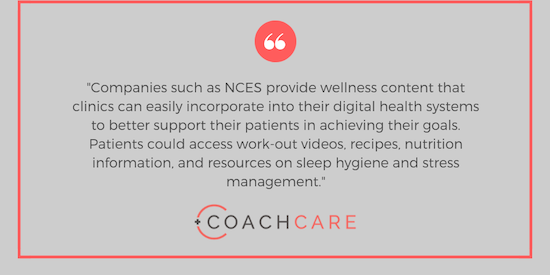Research Shows Health Consumers Are Focused on Patient Wellness and Value-Based Care
Wellness can sometimes seem like an intangible goal, but it is has become the focus of many health consumers, according to a recent study. Patients are increasingly looking for health services that center wellness and value over volume - quality versus quantity. And this growing desire for a more holistic approach offers clinicians an unprecedented opportunity to use digital health technologies to engage patients in their own wellness journey.

The Health Ambitions study surveyed 1,000 adult healthcare consumers and found that most respondents’ health goals centered on physical and mental well-being. Some notable goals included finding ways to improve sleep, stress management, diet, and the relationship between patient and physician.
Focus on Patient Wellness
These healthcare business insights reported that when asked what they would do with an extra hour each day, almost 2 in 3 patients said they would use it to improve their physical and mental health. Almost a third said they would spend some of that extra hour tracking and analyzing their health data. And nearly 1 in 5 patients said they would allocate that time to talking with their doctors about their health goals.
Other responses to that question over extra time suggest an indirect pursuit of wellness, with some patients saying they would spend the hour with friends and family, or sorting out finances and other practical, but often stressful, tasks.
Some of the key health and wellness goals that emerged from this survey included:
- Eating better (58%)
- Improving fitness (54%)
- Reducing stress (40%)
- Developing better sleep habits (39%)
- Improving mental health (36%)
- Handling finances better (34%)
- Creating a better work/life balance (19%)
- Quitting smoking (6%)
Companies such as NCES provide health and wellness education that clinics can easily incorporate into their weight management programs, and with their healthy resource hub, Your Wellness Spot, offer better support patients in achieving the goals above. For example, patients could access work-out videos, recipes, nutrition information, and resources on sleep hygiene and stress management via a patient portal or be directed to a wellness-focused blog via their physician-branded patient mobile app to improve wellness while away from the clinic. Such content helps patients to stay motivated and engaged in their own wellness journey, while supporting an improved relationship between clinicians and patients and leads to greater healthcare business insights.
Indeed, patients are very aware of how their relationship with their health care team impacts their wellness goals.
Patient-Provider Communication Concerns and Solutions
This latest survey revealed several common concerns:
- 86% want a physician who is familiar with their mental health history
- 84% think it is important that their primary physician understands how they handle stress
- 66% of patients think it is important to have access to appointments when needed
- 59% wanted coordinated care through dedicated clinicians
- 59% think it is essential that their clinician discuss healthcare costs with them
Interestingly enough, 37% of patients said that health technologies such as digital messaging would make communication more convenient and improve patient-doctor rapport. Such strategies might include text, email, or secure messaging through an online portal.
Virtual visits with a physician were also viewed by 32% of respondents as a way to improve communication. And patients are big fans of health apps, with almost half (43%) saying that they already use these to help meet their health goals.
This dedication to wellness is a fantastic opportunity for clinicians interested in offering more than a simple fee-based stratified service. Many health care providers have long understood the value of value-based care and how mental and physical health go hand in hand. Moving away from acute care and a reactive approach to a proactive, preventative, holistic model can dramatically improve quality of life for all patients. Now, finally, patient motivation is matched by emerging and established digital health technology that can help create a real sea change in health care.
About CoachCare:
CoachCare powers clinics with a virtual health and remote patient monitoring platform that reflects your unique workflow and protocol. Remote patient monitoring insurance features drive significant additional revenue while lowering the overall cost of care. Contact us to learn more.